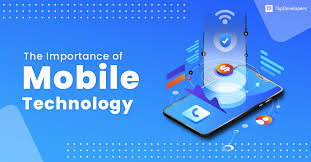Mobile Technology — Revolutionizing the Modern World
Introduction to Mobile Technology
Mobile Technology refers to the use of portable devices, wireless communication systems, and internet connectivity that allow people to communicate, work, and access information anytime and anywhere. From making phone calls to streaming movies, mobile technology has completely transformed human communication and lifestyle.
Today, smartphones are more than just phones — they are mini-computers that connect people globally, enable instant communication, support e-learning, entertainment, online shopping, and even health monitoring. In short, mobile technology has become an essential part of modern life.
History and Evolution of Mobile Technology
The journey of mobile technology began in the 1980s with the introduction of 1G analog phones. These early mobile devices were large, expensive, and could only make voice calls.
Over the years, mobile technology evolved rapidly:
-
2G brought text messaging (SMS) and better sound quality.
-
3G introduced internet browsing and multimedia.
-
4G enabled high-speed data, online gaming, and video streaming.
-
5G, the latest generation, offers lightning-fast connectivity, enabling smart cities and autonomous systems.
The upcoming 6G networks are expected to connect humans, devices, and AI systems in real time, creating a truly intelligent world.
Generations of Mobile Networks (1G to 6G)
Each generation of mobile technology represents a leap in performance and connectivity:
| Generation | Period | Features & Advancements |
|---|---|---|
| 1G | 1980s | Analog voice calls only |
| 2G | 1990s | Digital voice, SMS, and basic internet |
| 3G | 2000s | Mobile internet, video calls |
| 4G | 2010s | High-speed data, HD video streaming |
| 5G | 2020s | Ultra-fast internet, IoT, smart devices |
| 6G | Future | AI-powered, holographic communication, real-time data |
Each generation not only improved speed but also changed how humans interact with technology.
Mobile Devices and Hardware Components
Modern mobile devices come in various forms such as smartphones, tablets, smartwatches, and wearables.
Their performance depends on key hardware components like:
-
Processor (CPU): The brain of the device.
-
GPU: Handles graphics and gaming performance.
-
RAM and Storage: Control speed and capacity.
-
Sensors: Detect motion, light, and location (e.g., gyroscope, GPS).
-
Battery and Display: Provide power and visual output.
Continuous hardware innovation has made devices more powerful, compact, and energy-efficient.
Mobile Operating Systems
A mobile operating system (OS) is the software that runs and manages all functions on a mobile device. The most popular mobile OS platforms include:
-
Android: Open-source system developed by Google, used by brands like Samsung and Xiaomi.
-
iOS: Apple’s operating system, known for security and smooth performance.
-
HarmonyOS: Developed by Huawei for IoT integration.
-
Others: KaiOS, Windows Mobile, and custom systems for smart devices.
Each OS provides a unique user experience, app ecosystem, and security framework.
Mobile Applications (Apps)
Mobile apps are the core of the smartphone experience. They allow users to perform specific tasks quickly and efficiently.
Common app categories include:
-
Social Media: Facebook, Instagram, X (Twitter), TikTok.
-
Productivity: Google Docs, Microsoft Office, Evernote.
-
Gaming: PUBG, Candy Crush, Free Fire.
-
Finance: PayPal, Google Pay, PhonePe, investment apps.
-
Education: Duolingo, Coursera, BYJU’S.
Apps have made mobile devices powerful tools for work, learning, communication, and entertainment.
Mobile Internet and Data Services
The mobile internet allows users to access online content through cellular networks and Wi-Fi.
-
Mobile Data: Provided by telecom networks (3G, 4G, 5G).
-
Wi-Fi: Connects devices through wireless routers.
-
Hotspots: Allow one device to share its internet connection with others.
High-speed mobile data has made streaming, cloud access, and real-time communication possible anywhere in the world.
Mobile Communication Technologies
Mobile communication depends on various technologies that enable connectivity:
-
GSM (Global System for Mobile Communications): Standard for voice and SMS.
-
CDMA (Code Division Multiple Access): Used for faster and more secure calls.
-
LTE (Long Term Evolution): A 4G standard for high-speed internet.
-
5G: The latest standard with ultra-fast speed and low latency.
These technologies ensure smooth communication and data transfer between devices globally.
Mobile Security and Privacy
With increasing mobile use, security and privacy have become major concerns. Common threats include:
-
Hacking and Phishing Attacks
-
Malware and Spyware
-
Data Theft and Unauthorized Access
To stay safe, users should:
-
Use strong passwords and biometric locks.
-
Avoid untrusted apps and links.
-
Enable encryption and regular software updates.
Mobile security ensures that personal and financial data remain protected.
Mobile Payment Systems (m-Commerce & Fintech)
Mobile devices have turned into digital wallets, giving rise to mobile commerce (m-commerce) and financial technology (fintech) innovations.
Popular payment methods include:
-
Mobile Banking Apps for instant transactions.
-
Digital Wallets: Google Pay, Paytm, and Apple Pay.
-
UPI (Unified Payments Interface): Real-time bank-to-bank transfers.
-
NFC Payments: Contactless payments using Near Field Communication.
-
Cryptocurrency Apps: Enable blockchain-based transactions.
These systems make financial operations faster, easier, and more secure.
Mobile Hardware Innovations
Mobile hardware has seen incredible progress in recent years:
-
Foldable Screens for flexible smartphones.
-
AI Chips that enhance performance and photography.
-
High-Resolution Cameras with multiple lenses.
-
Fast-Charging Batteries and improved energy efficiency.
These innovations make mobile devices more intelligent and user-friendly than ever before.
Mobile Software Development
Developers use various programming languages and frameworks to create mobile apps and systems.
Common tools include:
-
Languages: Java, Kotlin (for Android), Swift (for iOS), Dart (for Flutter).
-
Frameworks: React Native, Flutter, Xamarin.
-
Development Kits: Android Studio, Xcode.
Modern mobile development focuses on performance, UI design, and cross-platform compatibility.
Mobile Cloud Computing
Mobile Cloud Computing (MCC) combines the power of cloud technology with mobile devices.
It allows users to store, access, and process data online instead of locally. Examples include Google Drive, iCloud, OneDrive, and Dropbox.
Benefits include:
-
Saving storage space
-
Data backup and synchronization
-
Accessing files from multiple devices
Cloud services make mobile devices lighter and more efficient while providing unlimited storage and computing power.
Impact of Mobile Technology on Society
Mobile technology has deeply influenced modern society:
-
Social Connectivity: People can communicate globally through messaging and video calls.
-
Digital Learning: Students access online classes and educational apps.
-
Remote Work: Employees work from anywhere using mobile tools.
-
Entertainment and Media: Movies, music, and games are available on-demand.
However, excessive mobile use can also lead to distractions and digital addiction. Balance is key to using technology responsibly.
Future of Mobile Technology
The future of mobile technology looks even more exciting. Key trends include:
-
6G Networks: Offering ultra-high speeds and intelligent connectivity.
-
Internet of Things (IoT): Connecting smart homes, cars, and cities.
-
Wearable Tech: Smartwatches, AR glasses, and health monitors.
-
AI-Powered Smartphones: Personalized user experiences and automation.
Mobile technology will continue to shape the way humans live, work, and interact — making the world more connected and intelligent.
Conclusion
Mobile technology has become the backbone of modern communication and innovation. From 1G voice calls to 5G smart systems, it has connected the world in ways once unimaginable.
As we step into the era of 6G, AI integration, and smart devices, mobile technology will not only connect people — it will empower them to live smarter, safer, and more productive lives.

